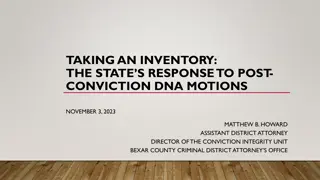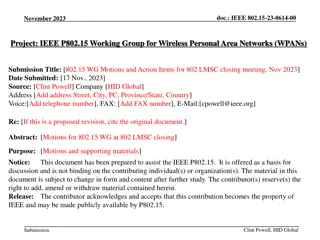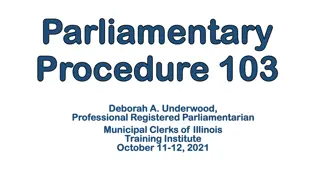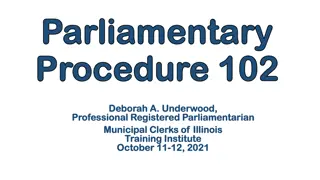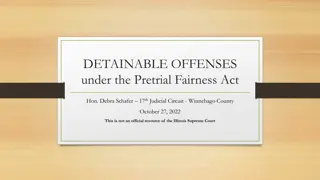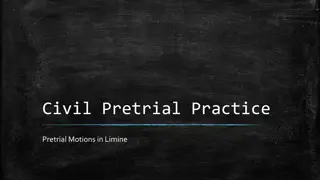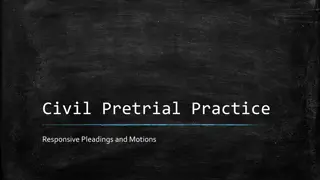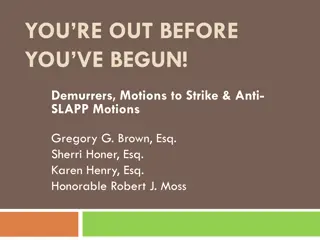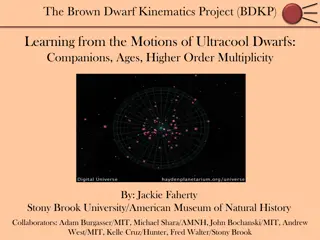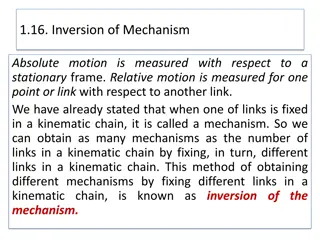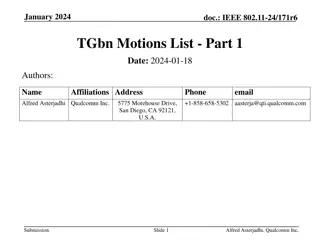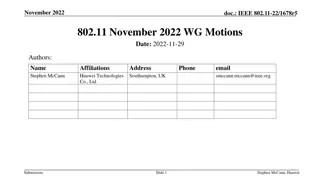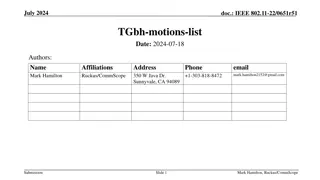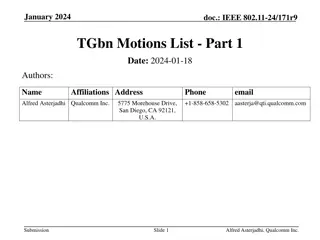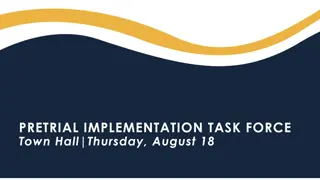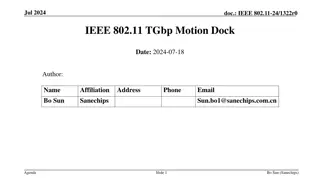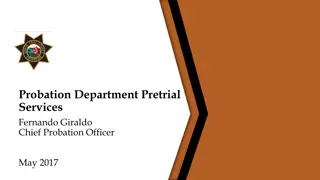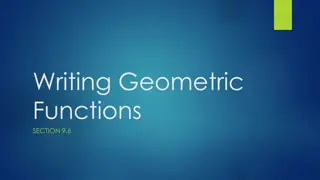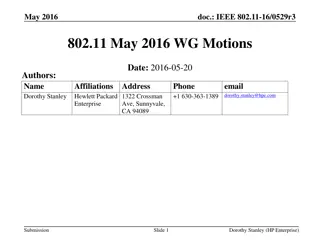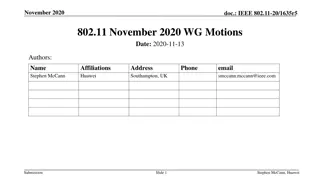Discovery Motions in Civil Pretrial Practice
In civil pretrial practice, discovery motions play a crucial role when the opposing party fails to respond adequately to formal discovery requests. These motions include Motion to Compel, Motion to Compel Further, and Motion to Deem Facts Admitted. By filing these motions, parties can seek court orders compelling responses, further responses, or deeming certain facts admitted if responses are lacking or incomplete. It is essential to understand the procedures and requirements involved in utilizing these discovery motions effectively.
Uploaded on Jul 31, 2024 | 0 Views
Download Presentation

Please find below an Image/Link to download the presentation.
The content on the website is provided AS IS for your information and personal use only. It may not be sold, licensed, or shared on other websites without obtaining consent from the author.If you encounter any issues during the download, it is possible that the publisher has removed the file from their server.
You are allowed to download the files provided on this website for personal or commercial use, subject to the condition that they are used lawfully. All files are the property of their respective owners.
The content on the website is provided AS IS for your information and personal use only. It may not be sold, licensed, or shared on other websites without obtaining consent from the author.
E N D
Presentation Transcript
Civil Pretrial Practice Discovery Motions
Discovery Motions Sometimes, as you conduct discovery in your civil case, the opposing side fails torespond, or responds inadequately,toyourformal discovery requests. 1. Motion to Compel: If the opposing side does not respond to your form interrogatories, special interrogatories, or request for production, you may file a motion seeking an order compelling the opposing party to respond. 2. Motion to Compel Further: If the opposing side served responses to your form interrogatories, special interrogatories, or request for production that were incomplete or otherwise void (e.g., not verified), you would need tofile amotion tocompel further responses. 3. Motion to Deem Facts Admitted: If a party fails to respond to your Request for Admissions entirely, the party who served the Request for Admissions is entitled to a court order deeming each of the facts listed in the Request for Admissions to be true, and each document listed in the Request tobe deemed genuine.
Discovery Motions Motion to Compel If the opposing side does not respond to your form interrogatories, special interrogatories, or request for production, you may file a motion seeking anordercompelling the opposingparty to respond. The party whom fails to respond waives any right to exercise the option to produce writings under Section 2030.230, as well as any objection to the interrogatories, including one based on privilege or onthe protection forworkproduct. The court, on motion, may relieve that party from this waiver on its determinationthatbothofthe followingconditionsaresatisfied: 1. The party has subsequently served a response that is in substantial compliance with Sections2030.210, 2030.220, 2030.230,and 2030.240and 2. The party s failure to serve a timely response was the result of mistake, inadvertence, orexcusable neglect.
Discovery Motions Motion to Compel Further If a party to whom interrogatories are directed serves an inadequate response, the party propounding the interrogatories may move for anordercompelling furtherresponse tothe interrogatories. Aresponsemaybe inadequate if anyofthe following apply: 1. Ananswertoaparticularinterrogatoryisevasiveorincomplete; 2. An exercise of the option to produce documents under Section 2030.230 is unwarrantedortherequired specificationofthosedocuments is inadequate; 3. Anobjectionto aninterrogatoryiswithoutmerit ortoogeneral.
Discovery Motions Motion to Deem Facts Admitted If a party fails to respond to a Request for Admissions entirely, the party who served the Request for Admissions is entitled to a court order deeming each of the facts listed in the Request for Admissions to be true, and each document listed in the Request tobe deemed genuine. If a motion to deem the admissions admitted is filed, the responding party can prevent his or her admissions being deemed true by serving adequate responses prior to the hearing date of the motion.Generally the responding partystill must paythe sanction. Even if your motion is granted, it may be possible for the party whose admissions were deemed admitted to file a Motion for Relief from Admissions under certain circumstances. Unless a successful Motion for Relief from Admissions is filed, any admissions deemed admitted must be considered true by the court or jury, and the party whose admissions were deemed admitted will be prevented from presenting evidence inconsistent with the admittedfacts at trial.
Discovery Motions Meet and Confer Requirement Meet and Confer: Before you file your motion, you must first attempt to meet and confer with the opposing party. This typically means sending a letter that informs the opposing party that the deadline to respond has passed or that their responses are inadequate, and providing him or her a reasonable time to respond, after whichyouwouldfile amotiontocompel responses. A reasonable time to respond to your letter could be two weeks, or longer if the interrogatories or requests for production are particularly complicated. The meet and confer requirement is your opportunity to demonstrate to the court that you are making a reasonable and good faith attempt at an informal resolution. CCP 2016.040. Although not required, it is a good idea to have someone who is over 18 and not a party to the case mail the letter for you, and complete a Proof of Service by First Class Mail (POS-030). That way, if you are forced to file a motion with the court, youcanattachtheproofofservice asanexhibit toyour motion.
Discovery Motions Preparing the Motion You must file a separate motion for each of the discovery responses youwish to compelordeemadmitted. The motion must identify the interrogatories, demands, or requests by set andnumber. A discovery motion consists of the following parts: 1. Notice of Motion & Motion; 2. Memorandum of Points and Authorities; 3. Separate Statement (not required if no responses were provided); 4. Declaration(s); 5. Exhibit(s); 6. Proposed Order; 7. Proof of Service.
Discovery Motions Preparing the Motion Notice of Motion & Motion The Notice of Motion tells the opposing party when and where the motion is scheduled to be heard. The Motion tells the court and the opposing party what is being requested.
Discovery Motions Preparing the Motion Points and Authorities The Memorandum of Points and Authorities explain to the court and the opposing party the legal basis ofthemotion. 1. Introduction 2. LegalStandard 3. Argument 4. Conclusion
Discovery Motions Preparing the Motion Separate Statement A separate statement is a separate document filed and served with the discovery motion that provides all the information necessary to understand each discovery request and all the responses to it that are atissue. Any motion involving the content of a discovery request or the responses to such a request must be accompanied by a separate statement. A separate statement is not required when no response has been provided to the request fordiscovery. The separate statement must be full and complete so that no person is required to review any other document in order to determine the full request and the full response. Material must not be incorporated into the separate statement byreference.
Discovery Motions Preparing the Motion Separate Statement (Cont.) The separate statement must include-for each discovery request (e.g., each interrogatory, request for admission, deposition question, or inspection demand) to which a further response, answer,or production isrequested-the following: 1. The text of the request,interrogatory, question,or inspectiondemand; 2. The text of each response,answer, orobjection, and any further responsesoranswers; 3. A statement of the factual and legal reasons for compelling further responses, answers, or productionas toeach matter indispute; 4. If necessary, the text of all definitions, instructions, and other matters required to understand each discoveryrequestand the responsesto it; 5. If the response to a particular discovery request is dependent on the response given to another discovery request, or if the reasons a further response to a particular discovery request is deemed necessary are based on the response to some other discovery request, the other requestand the responseto itmust be set forth; and 6. If the pleadings, other documents in the file, or other items of discovery are relevant to the motion, the party relyingon themmust summarize each relevant document.
Discovery Motions Preparing the Motion Declaration(s) & Exhibit(s) Declaration(s) provides evidence, sworn under penalty of perjury, supporting the motion. Exhibits should be attached to the declaration and typically include copies of the discovery at issue, responses (if any), and anymeet and confer documents.
Discovery Motions Preparing the Motion Proposed Order A Proposed Order is a separate document which sets forth what the movingparty is seeking for the judge tosign. The party who brings the motion usually must prepare the Proposed Order. After a hearing, the Court may either modify the Proposed Order, instruct the movingpartyto modify it or prepare itsownOrder. Notice of Ruling: The attorney for a party who obtains a favorable ruling usually has the responsibility of preparing a Notice of Ruling based on the Court s decision. A Notice of Ruling is not the same as the Court s Order, but usually attaches a copy of the final,signedOrder asanexhibit. If all parties are present at the hearing, the Court may ask if all parties waivenotice, which relievesthe winning party from preparing andservinga Notice of Ruling.
Discovery Motions Preparing the Motion Proof of Service You must complete a proof of service that identifies which documents are served, how they are served and to whom they are served. The Proof of Service can be completed on pleading paper or using a Proof of Personal Service (POS-020) or a Proof of Service by First ClassMail (POS-030) form. The Proof of Service must be signed by someone over the age of 18 who is not a party in the case, who verifies that they either personally delivered or mailed a copy of the motion and all related documentstothe opposingparty.
Discovery Motions Timing Notice Deadline: You must give notice of the motion within 45 days of the service ofthe verified response,oranysupplementalverified response.CCP 2030.300(c). Ifnoresponses areserved,thereisno deadline,otherthantheoverall motioncut-offdate. The propounding party and the responding party may agree in writing to extend the notice deadline. Filing Deadline: The motionmust be filed with the court at least sixteen court days priorto thehearingdate.CCP 1005. CourtdaysareMondaythroughFriday, excludingcourtholidays. To determine whether a particular filing date will meet this deadline, start with your desired hearingdateandcountbackward, CCP 12c,sixteencourtdays. The sixteenth court day prior to the hearing is the last possible date that the motion can be filedwiththecourt. Service Deadline: Prior to filing the motion with the court, all other attorneys, or self-representedpartiesinacasemust be served withacopyofthe motion.
Discovery Motions Oppositions and Replies Opposition: If the opposing party wants to file an Opposition to the Motion, they must file the papers at least nine court days prior to the hearing, and serve them (by hand, fax, or overnight delivery) to arrive the dayafter filing. CCP 1005. The opposition contains a memorandum of points and authorities and usually a declaration,but doesnotneed the noticeofmotionormotion. Reply: The Reply to the Opposition must be filed five days before the hearing, and served (by hand, fax, or overnight delivery) to arrive the dayafterfiling. CCP 1005. The Reply should carefully address any points made by the Opposition, especiallyifthatpointwasnotoriginallyaddressed inyour Motion.
Discovery Motions Sanctions The court shall impose a monetary sanction against any party, person, or attorney who unsuccessfully makes or opposes a motion to compel or motion to compel a further response to interrogatories, unless it finds that the one subject to the sanction acted with substantial justification or that other circumstances make the imposition ofthe sanctionunjust. CCP 2030.290(c), 2030.300(d). Sanctions may be awarded even though no opposition to the motion was filed, or an opposition to the motion was withdrawn, or the requested discovery was provided to the moving party after the motion wasfiled. CRC 3.1348(a). Monetary sanctions may include the moving party s reasonable expenses in enforcingthe discovery. CCP 2023.030(a).






